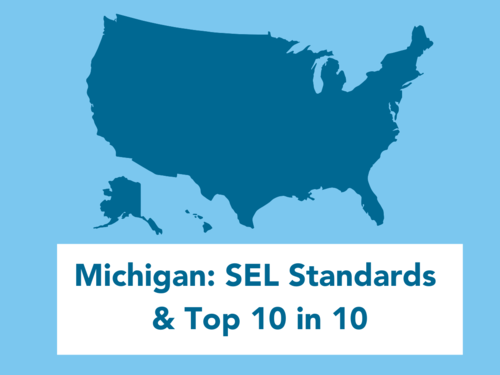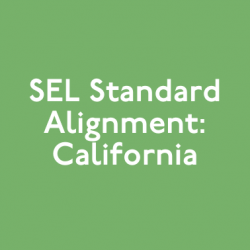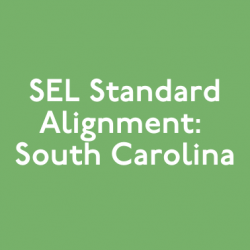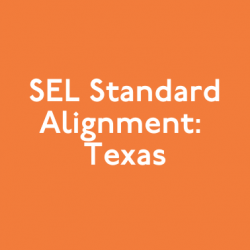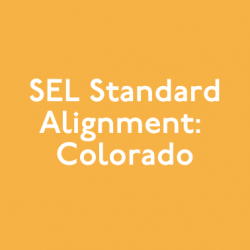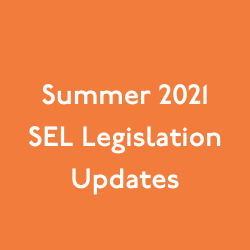Michigan’s Department of Education released social emotional competencies and indicators in 2017, acknowledging that the current Content State Standards were focused on academic areas and did not directly address other aspects of the whole child. The social-emotional learning standards in Michigan align and closely support many other initiatives the DOE is prioritizing. How are your districts and schools implementing SEL and how can Move This World support your initiatives? Keep reading or request a demo of our social emotional programs and see how you can provide students and educators with the tools they need to support social emotional learning in and out of school.
MDE’s Social Emotional Learning Competencies & Indicators
Michigan’s SEL standards align to the five core social emotional learning competencies as defined by the Collaborative of Academic, Social and Emotional Learning (CASEL), including: self-awareness, self-management, social awareness, relationship skills and responsible decision making. Each competency is broken down into 3-4 indicators and are further differentiated by grade level skills and strategies for PreK-12.
MDE’s Top 10 in 10
In 2016, Michigan created a strategic plan that would put them in a position to become a top 10 education state within 10 years. Seven goals were outlined, with four aligning directly to social emotional learning.
Goal 1: Provide every child access to an aligned, high quality P-20 system from early childhood to post-secondary attainment to maximize lifetime learning and success.
The P-20 System outlines a seamless development of all learners, pre-natal through adulthood. Initiatives and programs focused on social emotional learning as well as educating educators on the key social and emotional milestones students should development throughout their PreK-12 education. Move This World offers a PreK-12 social emotional learning program that grows with the students as they progress throughout the district. Take a look at Move This World 19-20 PreK-12 scope and sequence here.
Goal 2: Implement, with strong district & building leadership, high-quality instruction in every classroom through a highly coherent, child-centered instructional model where students meet their self-determine academic and personal goals to their highest potential.
Developing skills within self awareness, self management, and responsible decision making will help to ensure child-centered learning environments. Students will spend time exploring their interests and passions, and set goals in order to achieve this. They will develop emotional and stress management skills, so that they can navigate conflict and persist in the face challenges. A student of Madison Elementary in Adrian, Michigan, explains “We use those [Move This World] strategies when we’re angry, sad or have any emotion we recognize. It helps us be successful.”
Goal 4: Reduce the impact of high-risk factors, including poverty, and provide equitable resources to meet the needs of all students to ensure that they have access to quality educational opportunities.
Implementing evidence-based student supports, such as social emotional learning programs and mental health initiatives, contribute to ensuring we are providing an equitable learning environment for all students. We know that all students benefit from explicit SEL instruction and time to cultivate these important skills. Providing students with a tier 1 social emotional learning support will ensure all students have an opportunity to develop these skills and help teachers proactively identify who need tier 2 and 3 supports. Learn more about how to integrate social emotional learning in your MTSS framework.
Goal 5: Ensure that parents/guardians are engaged and supported partners in their child’s education.
Research has overwhelmingly demonstrated that parent engagement in a child’s education and school community has a positive effect on students’ achievement. Engaging families helps strengthen SEL skills and create opportunities for children to identify and express their emotions at home. Download Move This World’s SEL Toolkit to discover 4 strategies to engage families in SEL.
College & Career Readiness
Social emotional learning develops important skills for career, college and life, such as: collaboration, problem solving, communication, conflict resolution, goal setting leadership skills and establishing growth mindset. These core SEL skills will be essential to students on their path to college and career readiness, as they develop the ability to successfully work in teams, navigate obstacles, and set goals.
School Culture & Environment
Social emotional learning develops communication and collaboration skills, helping students and staff be better able to work together. Move This World is specifically meant to be implemented as a school-wide initiative, in order to truly impact school culture, build community and develop a common language around mental health. Impact data has indicated improvements in school culture and climate, and improved relationships student to student, student to teacher, student to administrator and teacher to administrator. By improving school culture and climate and the relationships within the school building, people will be better able to support one another and work as a team. Past partners have reported:
-
20% point improvement in teachers who describe the relationships between teachers and administrators at their school as “very good.”
-
17% point increase in teachers who describe the relationships between administrators and students at their school as “very good.”
To read more about Michigan’s social emotional learning competencies and indicators, visit the Department of Education’s outline.
